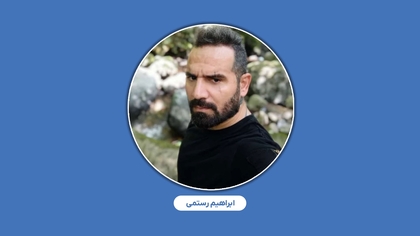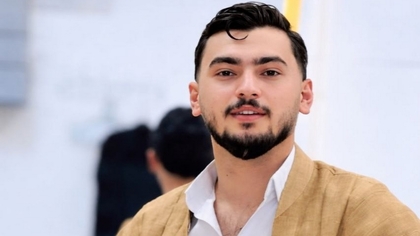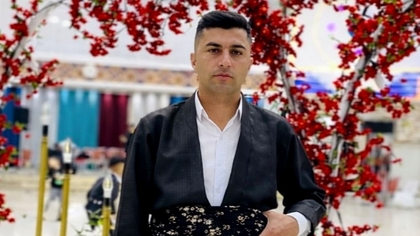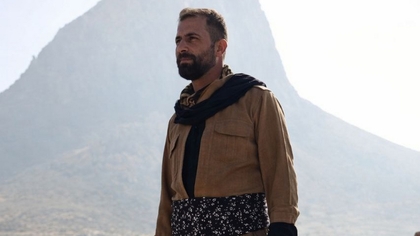Abdulhakim Bashar: No areas have been liberated in Syrian Kurdistan in any meaningful sense.
02:01 - 29 July 2012
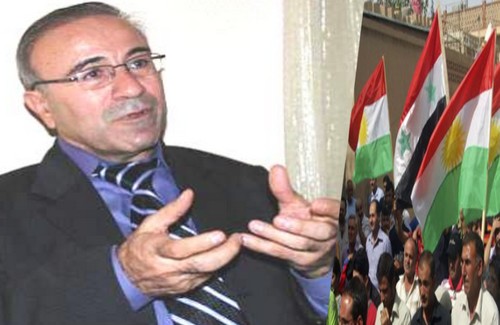
By Michael Weiss
The assassination last week of four key members of Bashar al-Assad’s “crisis management cell” eclipsed what may have been a more important victory in the war against his regime: the “liberation” of the Kurdish al-Hasekah region of Syria. A new compact has provisionally united all Syrian Kurdish groups against Assad. The Hawler Agreement, about which I blogged last week, has led to the formation of a Supreme Kurdish Council tasked with handling everything from security in Kurdish areas in Syria to foreign relations. Some analysts see in this Council the seeds of an aspiring autonomous or semi-autonomous Kurdish regional government in Syria, one that could theoretically stand in antagonism to whatever post-Assad state emerges.
The real achievement of this accord, however, is the reconciliation between the Kurdish National Council (KNC), an umbrella group representing Syria’s main Kurdish parties, and the Democratic Union (PYD), which is the Syrian arm of the Kurdish Workers Party (PKK). Turkey considers the PKK a terrorist organisation and is still very much at war with it. Moreover, the PYD was formerly seen to have allied with Assad’s military intelligence apparatus and suspicion is rife as to what its volte-face as a pro-revolutionary party represents.
Given Turkey’s military buildup at the Syrian border, and its hosting and indirect arming of the Free Syrian Army, how will this agreement affect Ankara’s future policy-making toward Syria? And how would the emergence of an autonomous Syrian Kurdistan, a counterpart to the Iraqi model, fit into a post-Assad state?
I contacted Dr Abdulhakim Bashar, the former chairman of the KNC who now heads its foreign affairs committee (he\'s also the Secretary-General of the Kurdish Democratic Party of Syria). I asked him to explain what the Hawler Agreement really means. To read an earlier interview I conducted with Dr Bashar in January, click here.
To what extent is the Hawler Agreement an equal accord between the PYD and the KNC? Will both groups decide by consensus how to police the liberated Kurdish cities and towns of Syria, or does the PYD still run its own policies in some areas?
There is no equality in the agreement. In fact, it is in favor of PYD both in terms of the political dimension, as PYD is known for its connection with the Syrian authorities, and in terms of the proportion of representation. At the time of the formation of the KNC, the Kurdish parties refused to give any concessions to the PYD and in this agreement, PYD has obtained many privileges which we accepted because of our strong will to avoid any Kurdish-Kurdish conflict in Syria, and also in order to focus on the efforts to overthrow the regime. Although the agreement emphasises on the management of the Kurdish areas consensually, the PYD is still applying its own policies in all Kurdish areas through its People\'s Protection Armed Forces.
How confident is the KNC that the PYD will be a partner given its previous alliance with the Assad regime and its attacks on, and threats against, KNC members?
The PYD has used the language of threats, intimidation and violence against the Kurdish activists and peaceful demonstrators. PYD’s ideology, their unwillingness to commit to joint work and their determination to lead the group which they work with suggests their non-acceptance of the KNC as a real partner, and despite that we will make every effort to implement the Erbil Agreement and fully comply with its articles of which the overthrow of the regime is one of its main points. This means that PYD must cut off all its previous relations with the Assad regime and prove it by deed.
President Barzani was the guiding force behind this agreement. In recent years, Turkey and the Kurdistan Regional Government (KRG) in Iraq have grown closer politically and more cooperative on security matters. Was Ankara aware of the Hawler Agreement before it was signed? Has it given any indications as to whether or not it will accept a semi-autonomous Kurdish region in Syria that is partly controlled by the PYD?
I do not think that Turkey was aware of this agreement. Turkey has a real desire to put all efforts in the service of bringing down the dictatorship. At the same time, I think Turkey will never allow the PYD to control Syrian Kurdistan, not even partly, and that is why it opposes any attempt at a Kurdish semi-autonomous or a federal region. However, we in the KNC and the Kurdish Democratic Party will act in accordance to the interests of our people, taking in consideration the reality of the New Syria and our own self potential.
There have been several incidents of both Kurdish and PKK-affiliated flags being raised in villages close to the Turkish border, raising concerns in the Turkish press and among its military establishment. Can you describe what\'s taking place? Is the KNC fearful that Turkey might intervene in Kurdish areas of Syria?
What happens is that the Syrian authorities have withdrawn from some of the administrative and civil services and handed their management over to the PYD members who in turn raised the flags of their party. In terms of liberation, no areas have been liberated in Syrian Kurdistan in any meaningful sense. Liberating any city would mean either partial liberation, or Kurdish control and the inability of the regime’s men to access it, or full liberation, the expulsion of all the security forces. None of this applies to what happened in Syrian Kurdistan. Members of the security forces constantly visit all the constituencies announced as liberated. In fact, we are very concerned about that because PYD’s armed control might lead to bad consequences, one of which is Turkish invasion of Syrian Kurdistan.
What kind of engagement has the KNC had with the Syrian National Council in recent weeks? The SNC president is himself a Kurd. Has this changed the KNC\'s prior view of the SNC as a Muslim Brotherhood-dominated vehicle for Arab Islamism?
Our relation with the Syrian National Council is good. Despite the main role of the Muslim Brotherhood in the SNC, our communications with the various Syrian opposition factions have so far proved that the SNC is the most responsive frame and closest to our vision about the future of Syria and the strategy of solution for the Kurdish issue in spite of the other differences between us in many national issues. I think the SNC is now working more realistically and with more responsibility than before, this could be because its new president is more familiar with the Syrian issues or perhaps the practical experiment of the SNC have given it more experience on various issues.
Michael Weiss is the Communications Director of The Henry Jackson Society, a foreign policy think tank, as well as the co-chair of its Russia Studies Centre. A native New Yorker, he has written widely on English and Russian literature, American culture, Soviet history and the Middle East. Follow @michaeldweiss
Source: The Telegraph
The assassination last week of four key members of Bashar al-Assad’s “crisis management cell” eclipsed what may have been a more important victory in the war against his regime: the “liberation” of the Kurdish al-Hasekah region of Syria. A new compact has provisionally united all Syrian Kurdish groups against Assad. The Hawler Agreement, about which I blogged last week, has led to the formation of a Supreme Kurdish Council tasked with handling everything from security in Kurdish areas in Syria to foreign relations. Some analysts see in this Council the seeds of an aspiring autonomous or semi-autonomous Kurdish regional government in Syria, one that could theoretically stand in antagonism to whatever post-Assad state emerges.
The real achievement of this accord, however, is the reconciliation between the Kurdish National Council (KNC), an umbrella group representing Syria’s main Kurdish parties, and the Democratic Union (PYD), which is the Syrian arm of the Kurdish Workers Party (PKK). Turkey considers the PKK a terrorist organisation and is still very much at war with it. Moreover, the PYD was formerly seen to have allied with Assad’s military intelligence apparatus and suspicion is rife as to what its volte-face as a pro-revolutionary party represents.
Given Turkey’s military buildup at the Syrian border, and its hosting and indirect arming of the Free Syrian Army, how will this agreement affect Ankara’s future policy-making toward Syria? And how would the emergence of an autonomous Syrian Kurdistan, a counterpart to the Iraqi model, fit into a post-Assad state?
I contacted Dr Abdulhakim Bashar, the former chairman of the KNC who now heads its foreign affairs committee (he\'s also the Secretary-General of the Kurdish Democratic Party of Syria). I asked him to explain what the Hawler Agreement really means. To read an earlier interview I conducted with Dr Bashar in January, click here.
To what extent is the Hawler Agreement an equal accord between the PYD and the KNC? Will both groups decide by consensus how to police the liberated Kurdish cities and towns of Syria, or does the PYD still run its own policies in some areas?
There is no equality in the agreement. In fact, it is in favor of PYD both in terms of the political dimension, as PYD is known for its connection with the Syrian authorities, and in terms of the proportion of representation. At the time of the formation of the KNC, the Kurdish parties refused to give any concessions to the PYD and in this agreement, PYD has obtained many privileges which we accepted because of our strong will to avoid any Kurdish-Kurdish conflict in Syria, and also in order to focus on the efforts to overthrow the regime. Although the agreement emphasises on the management of the Kurdish areas consensually, the PYD is still applying its own policies in all Kurdish areas through its People\'s Protection Armed Forces.
How confident is the KNC that the PYD will be a partner given its previous alliance with the Assad regime and its attacks on, and threats against, KNC members?
The PYD has used the language of threats, intimidation and violence against the Kurdish activists and peaceful demonstrators. PYD’s ideology, their unwillingness to commit to joint work and their determination to lead the group which they work with suggests their non-acceptance of the KNC as a real partner, and despite that we will make every effort to implement the Erbil Agreement and fully comply with its articles of which the overthrow of the regime is one of its main points. This means that PYD must cut off all its previous relations with the Assad regime and prove it by deed.
President Barzani was the guiding force behind this agreement. In recent years, Turkey and the Kurdistan Regional Government (KRG) in Iraq have grown closer politically and more cooperative on security matters. Was Ankara aware of the Hawler Agreement before it was signed? Has it given any indications as to whether or not it will accept a semi-autonomous Kurdish region in Syria that is partly controlled by the PYD?
I do not think that Turkey was aware of this agreement. Turkey has a real desire to put all efforts in the service of bringing down the dictatorship. At the same time, I think Turkey will never allow the PYD to control Syrian Kurdistan, not even partly, and that is why it opposes any attempt at a Kurdish semi-autonomous or a federal region. However, we in the KNC and the Kurdish Democratic Party will act in accordance to the interests of our people, taking in consideration the reality of the New Syria and our own self potential.
There have been several incidents of both Kurdish and PKK-affiliated flags being raised in villages close to the Turkish border, raising concerns in the Turkish press and among its military establishment. Can you describe what\'s taking place? Is the KNC fearful that Turkey might intervene in Kurdish areas of Syria?
What happens is that the Syrian authorities have withdrawn from some of the administrative and civil services and handed their management over to the PYD members who in turn raised the flags of their party. In terms of liberation, no areas have been liberated in Syrian Kurdistan in any meaningful sense. Liberating any city would mean either partial liberation, or Kurdish control and the inability of the regime’s men to access it, or full liberation, the expulsion of all the security forces. None of this applies to what happened in Syrian Kurdistan. Members of the security forces constantly visit all the constituencies announced as liberated. In fact, we are very concerned about that because PYD’s armed control might lead to bad consequences, one of which is Turkish invasion of Syrian Kurdistan.
What kind of engagement has the KNC had with the Syrian National Council in recent weeks? The SNC president is himself a Kurd. Has this changed the KNC\'s prior view of the SNC as a Muslim Brotherhood-dominated vehicle for Arab Islamism?
Our relation with the Syrian National Council is good. Despite the main role of the Muslim Brotherhood in the SNC, our communications with the various Syrian opposition factions have so far proved that the SNC is the most responsive frame and closest to our vision about the future of Syria and the strategy of solution for the Kurdish issue in spite of the other differences between us in many national issues. I think the SNC is now working more realistically and with more responsibility than before, this could be because its new president is more familiar with the Syrian issues or perhaps the practical experiment of the SNC have given it more experience on various issues.
Michael Weiss is the Communications Director of The Henry Jackson Society, a foreign policy think tank, as well as the co-chair of its Russia Studies Centre. A native New Yorker, he has written widely on English and Russian literature, American culture, Soviet history and the Middle East. Follow @michaeldweiss
Source: The Telegraph
